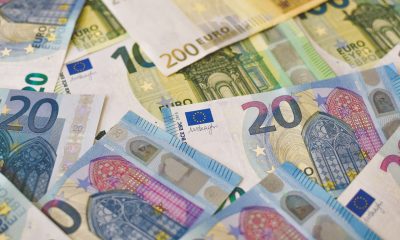Featured
Mooncard Raises €37 Million and Approaches Profitability
Mooncard claims to have more than 6,000 organizations equipped including 400 abroad and about 500 public institutions. The fintech company does not disclose its revenues or the amount of payment volumes managed, but these exceed €200 million per year and continue to double each year. The company is present in Germany, Austria, Belgium, Spain, Italy, and the Netherlands.

The French fintech company Mooncard, active in the corporate expense management market, announced, on April 18th, a €37 million Series C round of financing. The Paris-based start-up welcomes two new investors, Orange Ventures and the Canadian fund Portage. The historical investors (Aglaé Ventures, Blackfin Capital, Partech, and Raise Ventures) also participated.
The participation of Orange Ventures augurs potential synergies with the telecom operator, for example in data analysis for car fleet managers.
“For us, this fundraising is a way to solidify our foundations by strengthening the countries where we have been present for a little over a year, and to develop new projects, such as the opening of new countries, and M&A operations in 2023 or 2024,” explained company boss Pierre-Yves Roizot. “The goal is to build a sustainable project, over the long term. The time of unicorns is a bit over,” added the CEO, who would have nevertheless succeeded with this round of financing to increase the valuation of Mooncard by 45%. Profitability is expected this summer.
Read more about Mooncard and find the latest financial news of the day with the Born2Invest mobile app.
Mooncard offers customized payment cards
Mooncard, founded in 2016, offers a SaaS credit card solution for employees’ operational expenses, which also connects to the company’s accounting software (SAP, Cegid, Sage…) client to fully automate the processing of expenses and expense reports, which no longer need to be entered. The system also identifies recoverable VAT. It saves time for administrative departments, and avoids the need for employees to advance expenses.
The cards can be configured for each employee or user profile using 60 criteria, making it the most comprehensive solution on the market. For example, it is possible to set a daily spending limit and to activate spending categories (restaurants, gas stations, foreign purchases, online payments…) using “merchant codes” (MCC), a system that is harmonized internationally. In the event of an exceptional request, the manager is informed by SMS to react quickly. All operations can be consulted in real-time.
Monthly subscriptions start at €49 per month for SMEs and €500 for large groups, plus a fee of €5 per month per card. Mooncard’s business model is also based on commissions on each transaction, paid by Visa.
Mooncard has more than 6000 clients
The cards, physical or virtual, are issued by Visa and insured by AIG and Gras Savoye. Mooncard has partnered with Flying Blue to earn Air France-KLM miles for every purchase, similar to the American Express program.
The 150-person start-up claims to have more than 6,000 organizations equipped (including Air France, Mirakl, Vinci, Norauto), including 400 abroad and about 500 public institutions (Prime Minister’s office, ministries, regions, departments, police, gendarmerie). It does not disclose its revenues or the amount of payment volumes managed, but these exceed €200 million per year and continue to double each year. The company is present in Germany, Austria, Belgium, Spain, Italy, and the Netherlands.
In France, Mooncard claims to be “the leading pure player in the automation of corporate expenses, while having less than 1% of the global market”, in which banks are of course present, but also other players more specialized in expense reports, for example, or all the network brands that offer specific cards (fuel, dry cleaning, etc.). The aim of this fund-raising is to strengthen this leading position by generating profitable growth.
__
(Featured image by rupixen.com via Unsplash)
DISCLAIMER: This article was written by a third party contributor and does not reflect the opinion of Born2Invest, its management, staff or its associates. Please review our disclaimer for more information.
This article may include forward-looking statements. These forward-looking statements generally are identified by the words “believe,” “project,” “estimate,” “become,” “plan,” “will,” and similar expressions. These forward-looking statements involve known and unknown risks as well as uncertainties, including those discussed in the following cautionary statements and elsewhere in this article and on this site. Although the Company may believe that its expectations are based on reasonable assumptions, the actual results that the Company may achieve may differ materially from any forward-looking statements, which reflect the opinions of the management of the Company only as of the date hereof. Additionally, please make sure to read these important disclosures.
First published in L’USINEDIGITALE, a third-party contributor translated and adapted the article from the original. In case of discrepancy, the original will prevail.
Although we made reasonable efforts to provide accurate translations, some parts may be incorrect. Born2Invest assumes no responsibility for errors, omissions or ambiguities in the translations provided on this website. Any person or entity relying on translated content does so at their own risk. Born2Invest is not responsible for losses caused by such reliance on the accuracy or reliability of translated information. If you wish to report an error or inaccuracy in the translation, we encourage you to contact us.

-

 Biotech5 days ago
Biotech5 days agoPfizer Spain Highlights Innovation and Impact in 2024 Report Amid Key Anniversaries
-

 Cannabis2 weeks ago
Cannabis2 weeks agoGermany’s Cannabis Crossroads: Progress, Profits, and Public Concern
-

 Markets11 hours ago
Markets11 hours agoStock Markets Surge Amid Global Uncertainty, But Storm Clouds Loom
-

 Cannabis1 week ago
Cannabis1 week agoAurora Cannabis Beats Expectations but Faces Short-Term Challenges
























